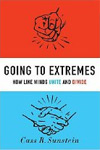 I’ve been reading Cass Sunstein’s ‘Going to Extremes‘ lately – it’s worth a look.
I’ve been reading Cass Sunstein’s ‘Going to Extremes‘ lately – it’s worth a look.
Sunstein’s conclusion – that when we are filtered into like-minded groups that we reinforce each other’s prejudices and tend to reach more extreme conclusions than we would if we were on our own – is not a particularly startling one in itself.
What is interesting is Sunstein’s discussion of how that polarisation happens and what the consequences of it are. He’s also very good on the question of how extremism isn’t always a bad thing.
More of that another time though. The reason I’m drawing attention to it is that I think Cass would be interested in this exercise that I kicked off yesterday – almost on a whim.
Slugger O’Toole is a site that I contribute to occasionally, as well as working with it’s founder on some offline projects. The site is largely devoted to issues in Northern Ireland’s politics, and Mick has often noted a phenomenon called ‘Whataboutery.’
It’s something of a conversation killer. A recent example that I found was where someone from Sinn Féin outlined views on violence against women. One of the first comments that appeared under the blog-post discussing this was that Sinn Féin members had no place discussing violence against women – after all, hadn’t the IRA killed lots of women in it’s time?
As points go, it’s not irrelevant, but neither was it designed to take the conversation about domestic violence to a productive place. (A clever commenter replied that Protestants had no grounds to speak about violence against women either – after all, Henry VIII beheaded two of his wives!)
Therefore, the reason I thought it would be a good idea to use debategraph to map ‘Whataboutery’ is because all of that enthusiasm for presenting one narrow exclusive point of view could be used to create something that the rest of us can use. Use the ‘hive mind’ comprised of the users of a large-ish website to construct a working model of a complex problem.
It also illustrates, I think, how active citizenship can be harnessed for the greater good. In the past, I’ve argued that consultations are often objectively undemocratic because they massively over-represent the views of people who feel strongly on specific issues and / or have more time on their hands than the rest of us.
The self-styled classical liberal blogger Tim Worstall has coined ‘Worstall’s Law of Organizations: “All and any organizations will in the end be run by those who stay awake in committee …”
But active citizenship works – I would suggest – when these people – often time-rich fanatics – have to compete with each other for the privilege of representing us for a few years at a time. As this debategraph illustrates, they may also be useful recruits to a hive mind mapping exercise. Perhaps we can learn a lot by listening to their general buzz of fanatics and busybodies even if we’d prefer to ignore their individual voices?








 A blog about representative democracy, social media and a conversational politics. How will peer-to-peer communications change local democracy? How is representation changing?
A blog about representative democracy, social media and a conversational politics. How will peer-to-peer communications change local democracy? How is representation changing? 









I think the key point of active citizens is that they get things done on the places where they live. If all they’re doing is adding to a buzz they’re not especially active.